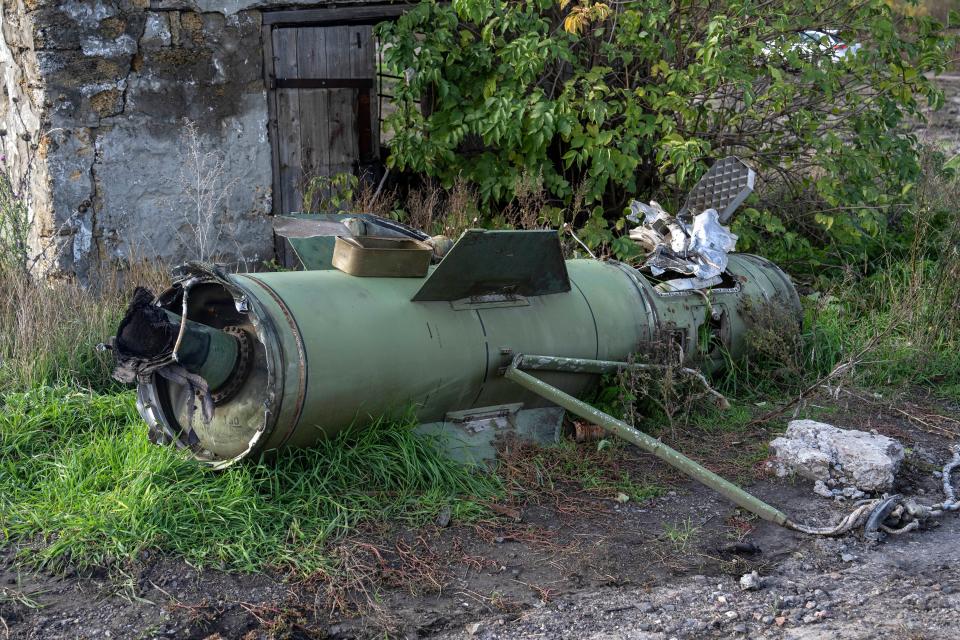Ukraine wants to prosecute Russians who launch missile strikes. Internet group says it found them
Executions, sex assaults and forced movements of civilians – the invasion of Ukraine has led to a steady stream of war crimes allegations against Russia's military, senior officials and President Vladimir Putin.
For Ukraine's war crimes investigators, the challenges sometimes look insurmountable: They must analyze crime scenes even as bombs are falling. They must prove soldiers had not just wartime motivation but criminal intent. They need to demonstrate beyond doubt that an attack wasn't an accident.
So far, Ukraine's effort to prosecute tens of thousands of alleged war crimes has mostly netted ground troops and tank crews.
Yet much of the destruction of Ukraine by Russia has come in the form of falling missiles and artillery shells. These have blasted apartment high-rises, schools, shopping centers, train stations and other settings across the country, in attacks Ukraine says were intentionally directed at civilian buildings with no military value – making the very launching of those missiles a war crime.
For investigators, that raises a unique challenge.
How can an investigator inside a war-torn country find and identify a specific criminal – perhaps a faceless Russian military technician – who might have launched missiles or given an order from behind a computer hundreds of miles away?
A new investigation from the online intelligence group Bellingcat claims it has made some progress in answering this question. Its findings may prove vital to the future of Ukraine's war crimes prosecutions.
War crimes trials could lead to international courts. But could they lead to Putin?
Reddit AMA: What does justice look like for Ukraine's war crimes victims?
The Backstory: How USA TODAY followed the trail of war crimes in Ukraine
What did Bellingcat find?
The report, titled "The Remote Control Killers Behind Russia’s Cruise Missile Strikes on Ukraine," lays blame on a secretive group of Russian military engineers whose educational and professional backgrounds are in missile programming.
The group, composed of three dozen technicians, works from two locations: Russia's ministry of defense headquarters, in Moscow, and its Navy headquarters, in St. Petersburg. They are part of an armed forces unit called the "Main Computation Center of the General Staff."
Bellingcat believes that these military engineers are directly responsible for programming the flight paths of at least a portion of the Russian missiles that have killed hundreds of Ukrainian civilians and damaged or destroyed residential and non-residential buildings and infrastructure all across Ukraine since the war's outset.

How good is the proof?
It's not watertight. It is highly suggestive. Bellingcat discovered, through cellphone metadata analysis, a spike in contact among individual members of the "Main Computation Center of the General Staff" and their superiors during times when Russia is known to have launched missile strikes that hit civilian infrastructure in Ukraine. "These strikes, that hit non-military targets, suggest either that the missiles failed to follow their pre-programmed flight path, that targeting was based on defective intelligence information, or that civilian harm was intentional," Bellingcat concluded.

Bellingcat identified members of the unit, including its commanders, by examining open-source information about graduates from Russian military institutes that specialize in missile engineering and programming. It then matched these names against leaked job and phone data about them that it acquired through Russia's underground data markets. This yielded matches between some of the graduates and those with employment links to the "Main Computation Center of the General Staff."
All of the unit's personnel were directly contacted by Bellingcat for comment and further corroboration. One person revealed additional "contextual information" about how the group does its work, the report says.
Bellingcat partnered with Latvian website The Insider and German magazine Der Spiegel for this work. Bellingcat published the names of those it believes are part of the unit.
If this is accurate, what happens to these people?
The short answer is if they don't ever leave Russia or there isn't a new government willing to work with Ukrainian and international prosecutors, probably not a lot.
Ukraine is committed to trying the majority of its war crime cases in its own courts. But to hold a trial, the country needs to have an actual defendant in custody.
The same goes for any potential international hearings, whether at the International Criminal Court in The Hague, Netherlands, or at a United Nations-appointed tribunal.
There are also unresolved legal questions about Bellingcat's findings. The group unearthed a clear correlation between an uptick in communication among members of the "Main Computation Center of the General Staff" and certain Russian missile launches. It did not definitively prove intent – that the unit's missile operators deliberately sought to hit civilian targets – or that its strikes weren't an honest mistake.
Prosecutors typically look for evidence of both to prove a war crime took place under international law.
Want to know more? Find out what you missed
War crimes in Ukraine may be unprecedented. So is the nation's push for swift justice
It's 6 mos. since Russia launched its war on #Ukraine. UA is also marking its #IndependenceDay amid fears of renewed Russian strikes. Our in-depth story on UA's complex effort to get justice for war crimes https://t.co/kp5fHuOvye
Visuals by @jakoscielniak
Editing by @jsusong— Kim Hjelmgaard (@khjelmgaard) August 24, 2022
This article originally appeared on USA TODAY: Internet group tries to help Ukraine identify Russians firing missiles

